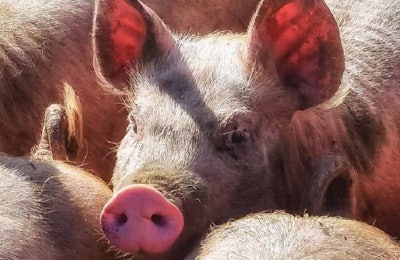
With a sudden increase in confirmed cases of African swine fever (ASF), national and local authorities in Vietnam are stepping up control measures to slow down the spread of the virus. New outbreaks have also been reported in domestic pigs in China, Romania and Ukraine, and among the European wild boar population.
As ASF spreads to new regions of Vietnam, Prime Minister Nguyen Xuan Phuc has called on the whole political system, sectors, enterprises and farmers to take “drastic measures” to control the disease, reports Vietnam News. He also instructed local authorities to pay compensation at a rate of 80 percent of the market price to farmers whose infected pigs have been culled.
Senior officials in so-far unaffected provinces in central and southern Vietnam have called for internal border controls to be set up on all routes for pigs, pork products and animal feeds as ASF is confirmed to have caused outbreaks in 10 provinces and to two new regions — Northeast and Northwest — from Red River Delta, also in the north of the country, where the first cases were seen in early February.
Source of the original infections remains unknown, according to the official report from the Ministry of Agriculture and Rural Development (MARD) to the World Organisation for Animal Health (OIE).
A total of 68 new outbreaks confirmed over the past week brings Vietnam’s total so far to 79, with more than 5,500 pigs lost to the disease through mortality or culling. Latest reports point to culling of high-risk herds before the animals succumb to the disease.
MARD has been assuring the Vietnamese population that there is no need for them to boycott safe pork products, reports Vietnam News, as the disease cannot be transmitted to humans.
By the end of last week, ASF had spread to a further two provinces in Vietnam, according to Xinhua, bringing the latest total to 12.
New ASF cases in China
Since the first outbreak in August 2018, China has recorded 112 outbreaks of ASF in 28 regions, according to the United Nations’ Food and Agriculture Organization (FAO). Restrictions have since been lifted by the authorities in 103 “epidemic zones.”
Chinese agriculture experts say that ASF is under control, reports Xinhua. Pork supplies have remained adequate and prices have been stable, according to a professor at China Agricultural University at a recent press conference.
Last week, China’s agriculture ministry informed OIE about one new outbreak of ASF at a farm with more than 11,000 pigs in the city of Yulin in Shaanxi province. Source of the infection is unknown.
A further new outbreak has been confirmed on the website of the agriculture ministry. More than 3,000 pigs were affected at a farm in Guigang city in Guangxi Zhuang Autonomous Region, which borders Vietnam. The usual emergency response procedures have been put in place by the authorities.
Taiwanese authorities are taking a range of measures to keep ASF out of its pig population as another pork product from China discarded at a border point tests positive for the ASF virus, reports Focus Taiwan. This brings the number of known positive samples to 30.
Taiwan has announced it will start to check all carry-on luggage of passengers arriving from Thailand for illegal pork products, according to Taiwan News. Visitors from China, Hong Kong, Macau, Vietnam, Laos and Cambodia are already subject to this level of checks.
Europe: More ASF in domestic pigs in Romania, Ukraine
Over the past week, Romania’s veterinary authority has confirmed eight new outbreaks among backyard pig herds in two counties in the northwest of the country, and a further three in the south. One hundred animals were involved in these outbreaks.
There has also been a new outbreak affecting 248 pigs at a farm in Nikolayev oblast in the south of Ukraine, according to the country’s animal health agency report to the OIE. This is the same region as a previous outbreak in January.
After just one ASF outbreak in a backyard herd in Dnipropetrovsk in January, Ukrainian authorities have declared the disease situation in that region “resolved” to the OIE.
ASF has also been eliminated from the south of the Republic of Moldova, according to the latest report from the national food safety agency to the OIE. The last outbreak was in a backyard herd in Cahul in December 2018.
At the end of February, it was announced that ASF had been eradicated from Czech Republic, and that European Union (EU) member states had voted to lift all restrictions on the country. No cases have been identified since April 2018, and the European Commission is expected to adopt the decision by other EU member states in the coming weeks.
ASF outbreaks continue in European wild boar
Over the past week, the veterinary agencies in five EU countries have reported new outbreaks of ASF among their respective wild boar populations to the OIE.
Based on these reports and in terms of the number of animals found dead or culled, worst affected was Hungary (179), followed by Poland (106), Belgium (67), Romania (59) and Latvia (four).
All these cases were in areas where previous cases have been identified, and where disease controls are reported to be in place.
View our continuing coverage of the African swine fever outbreak.

















